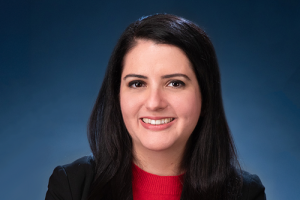Veronica Goodman: The Value of Policy and Personal Reputation
Published July 22, 2025
 Take it from Veronica Goodman, reputation matters.
Take it from Veronica Goodman, reputation matters.
That advice is invaluable for students enrolled in Goodman’s Economics for Public Decision-Making course, which she teaches in the MA in Public Management program at Johns Hopkins University. The same holds true for those working under her at the Center for American Progress, where she serves as CAP’s senior director for workforce development policy and interim team lead for higher education policy. She has built her own reputation as a respected policy expert, economic adviser, researcher, and writer. She is also the mother of three young children who has authored four children’s books.
“Washington, D.C. can get really small, really quickly,” she said. “My best advice to students and more junior colleagues is to make sure that you are always putting your best foot forward and being professional, thanking people when they help you, and not burning bridges. Because as people become more specialized and develop different areas of expertise, they come back around pretty often.”
Goodman has heeded her own advice. Growing up in the West Palm Beach area of Florida, in a family that valued and promoted education, Goodman caught the politics and policy bug early and knew that a move to D.C. would align with her career goals. She enrolled at George Washington University and studied international relations and economics as a way to understand policy. She went on to earn graduate degrees in public management and applied economics at Hopkins.
“When I was at GW, I was thinking about the tool set that would make the most sense in helping me understand policy and how it can be implemented,” she said. “I thought that economics was this great way of understanding the basics of how individuals, families, and companies make decisions – how they determine trade-offs and what they invest in versus what they don’t. I was also really interested in the bread-and-butter issues of labor and education economics, especially if you want to help families and workers, as I did then and continue to want to do.”
Prior to graduate school, Goodman served as a President William J. Clinton fellow in India, where she worked on human rights issues. Upon her return, she shifted her focus domestically to economic development policy work, interning at the White House Council of Economic Advisers, the White House Office of Management and Budget, and the U.S. Department of the Treasury. She has been working in policy since graduating from Hopkins in 2017.
In the think tank where she now works, Goodman embraces the research and writing aspects of her job under the higher education and workforce development umbrellas to set a policy agenda around what is going on in Congress, in the current administration, and tracking what’s happening on the state level.
“My role is to tie the work we are doing into what is happening on the Hill, talking to policymakers, and consulting to help Congress and agencies on policy decisions,” she said, “And since all policy is interconnected, I do a lot of work with other teams at CAP, including working on various economic policies. It’s collaborative and fun.”
Prior to joining CAP, Goodman worked at the Progressive Policy Institute and in the office of Senator Bob Casey (D-PA) where she had the opportunity to lift up the voices of his constituents and to advocate for “people who were in the trenches and experiencing the issues that we were working on.”
“Being able to use that platform to share their experiences and make them feel heard and seen at the table and letting them know that policymakers and their staffs were listening to them, was a really empowering experience. A lot of young people come to D.C. very idealistic and then get jaded by the policy process. I always try, to the best of my ability, to explain that we are playing the long game on many of the causes that we care about. I encourage them not to give up hope, and to focus on their small part, because it all adds up.”
It is this valuable encouragement that Goodman also brings to her JHU students, along with her invaluable first-hand experience.
“Within the course that I teach, we do a unit on tax policy,” she said. “I am able to explain the theory and broader concepts, of course, but then I can also provide examples of the analysis process that the Senate Finance Committee goes through. I feel like students really get engaged when they understand that, in the real world, this is actually relevant and connected to something that they might like to do professionally. When they tell me that they are interested in working on the Hill, or in a particular government agency, I always try to connect them with people I know in the policy world who may help them get to where they want to go.”
Goodman stakes her reputation on these connections as way to mentor and advance the next generation of leaders.
“Johns Hopkins is a great place to be a student and to get a sense of education, not only for education’s sake, but also to advance your career,” she said. “It’s been really great to teach, coming full circle and now being in front of the class. I think having my perspective as a former Hopkins student makes me a better teacher. Just as Program Director Paul Weinstein was very helpful in helping me navigate my own career, and discovering the work that I love, I hope to do the same for my students.”